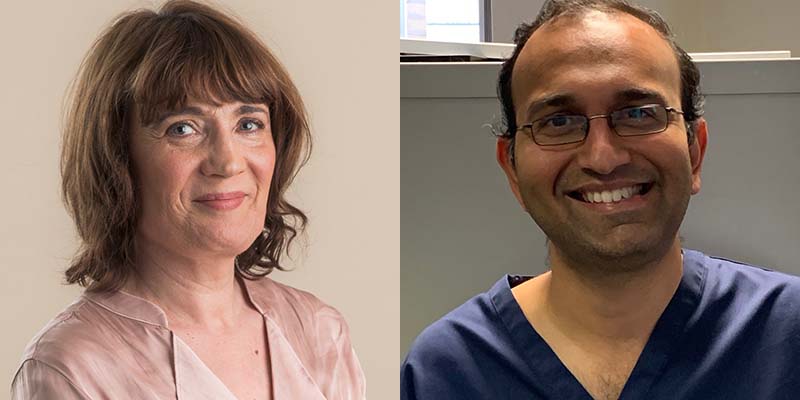Huddersfield shares heart health expertise with global audience
The University of Huddersfield and Calderdale and Huddersfield NHS Foundation Trust have drawn attention to the need for better awareness of cardiovascular health by hosting a webinar to mark the recent World Heart Day.
The Oastler Building on the University campus was lit up in red as Professor Felicity Astin from the Department of Nursing and Midwifery spoke on a range of subjects, including how prevention rather than cure is key to tackling cardiovascular disease (CVD) and her research into how much patients understand about treatments they could receive.
The webinar was introduced by Professor Barry Tolchard, Head of Nursing and Midwifery, and also featured guest speaker Dr Karthik Viswanathan, a Consultant Cardiologist from Calderdale and Huddersfield Foundation NHS Trust.
Study Nursing and Midwifery at the University of Huddersfield
CVD is responsible for claiming an estimated 17.9 million lives per year, making it the leading cause of death across the world. World Heart Day is a campaign from the World Heart Federation that aims to improve awareness of how people can make a difference to themselves through healthier lifestyles.
Prevention not cure is crucial to cardiovascular health
“There’s no cure for heart disease,” says Professor Astin. “Prevention can come about through healthy lifestyle change, taking medicines as prescribed and having treatments as we go.”
“The World Heart Federation’s drive is to reduce mortality from CVD, so issues like giving up smoking, better diet and more physical activity are high on the agenda. Changing how people think and act regarding their cardiovascular health is critical, as a way of slowing down the progression of the narrowing or the clogging up of the coronary arteries called atherosclerosis.
“The positive news is that the majority of coronary cardiovascular risk factors are actually lifestyle-related. There is also a link between mental health and CVD.”
The webinar also saw Professor Astin discuss another area of expertise, her research into the amount of information that patients understand or recall about forthcoming heart procedures.

Professor Astin published a survey study in the European Journal of Cardiovascular Nursing in 2019, which has subsequently earned her an award for its place in the top 5% of all research outputs for this journal scored by Altmetrics.
Increasing understanding of heart treatments
“I have done quite a lot of work trying to understand how much people know about a specific treatment, called coronary angioplasty. This treatment is one of the most common cardiac treatments in the world used to treat ‘clogged’ coronary arteries.
“A tiny tube is inserted up through an artery, in the groin or wrist, under X-Ray, into the coronary circulation. Once the narrowing is seen a tiny balloon at the catheter tip is inflated. This squashes the fatty plaque to open up the vessel to improve blood flow.
“The research we have done shows that patients don’t always fully understand what they are consenting to because they receive a lot of information in one go. They often overestimate the benefits and underestimate the risks and see the treatment as a cure, which it isn’t.
“The research shows that patients are not involved in shared-decision making for this treatment as much as we’d like, so there needs to be some work to help patients understand their role in shared decision-making and the consent process.”
Professor Astin was also a member of a Task and Finish Group convened by the General Medical Council (GMC) to update the international guidance on Shared Decision Making and Consent in the UK.
“Findings from the research enabled me to communicate the patient experience of consent to help shape the revised guidance.”
The webinar also saw Dr Viswanathan talk about how to recognize a heart attack and what to do. ,
“It is important that if you have any symptoms that may raise suspicion of heart disease or stroke that you seek urgent medical attention,” said Dr Viswanathan, who also talked about atrial fibrillation and stroke, as well as outlining the effects of alcohol on cardiovascular health.
“The revised GMC guidance outlines how best practice decision-making and consent is done,” adds Professor Astin. “The emphasis is on shared decision-making sure patients understand what they are saying yes and no to, as well as the risks and benefits. The revised guidance comes into force next month.”
The webinar was arranged by Dr Leanne Monchuk, Ms Lijie Yang, Ms Julie Berry and Ms Sybilla Daley.
Book sheds light on pharmacy policy
Two books from Professor Zaheer-Ud-Din Babar will help to lay the groundwork and will aid the decision process for policy.
Skin Research Institute hosts Wounds Research week
COVID-19 meant meeting had to move online - but a successful week means this could happen again in the future.
History reveals lessons on nursing in a pandemic
Investigating the role of nurses during the Spanish Influenza pandemic of 1918-19 finds parallels with the COVID-19 emergency.